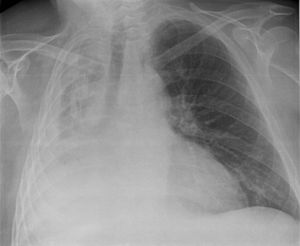Atelectasis
| Atelectasis | |
|---|---|
| Synonyms | collapsed lung |
 |
|
| Atelectasis of a person's right lung | |
| Classification and external resources | |
| Specialty | Pulmonology |
| ICD-10 | J98.1 |
| ICD-9-CM | 518.0 |
| DiseasesDB | 10940 |
| MedlinePlus | 000065 |
| eMedicine | med/180 |
| MeSH | D001261 |
Atelectasis (/ˌætᵻˈlɛktəsᵻs/ uses combining forms of atel- + , from Greek: , "incomplete" + ἔκτασις, "extension") is the collapse or closure of a lung resulting in reduced or absent gas exchange. It may affect part or all of a lung. It is usually not bilateral. It is a condition where the alveoli are deflated down to little or no volume, as distinct from pulmonary consolidation, in which they are filled with liquid. It is often called a collapsed lung, although that term may also refer to pneumothorax.
It is a very common finding in chest x-rays and other radiological studies, and may be caused by normal exhalation or by various medical conditions. Although frequently described as a collapse of lung tissue, atelectasis is not synonymous with a pneumothorax, which is a more specific condition that features atelectasis. Acute atelectasis may occur as a post-operative complication or as a result of surfactant deficiency. In premature neonates, this leads to infant respiratory distress syndrome.
May have no signs and symptoms or they may include:
It is a common misconception that atelectasis causes fever. A study of 100 post-op patients followed with serial chest X-rays and temperature measurements showed that the incidence of fever decreased as the incidence of atelectasis increased. A recent review article summarizing the available published evidence on the association between atelectasis and post-op fever concluded that there is no clinical evidence supporting this doctrine.
...
Wikipedia
